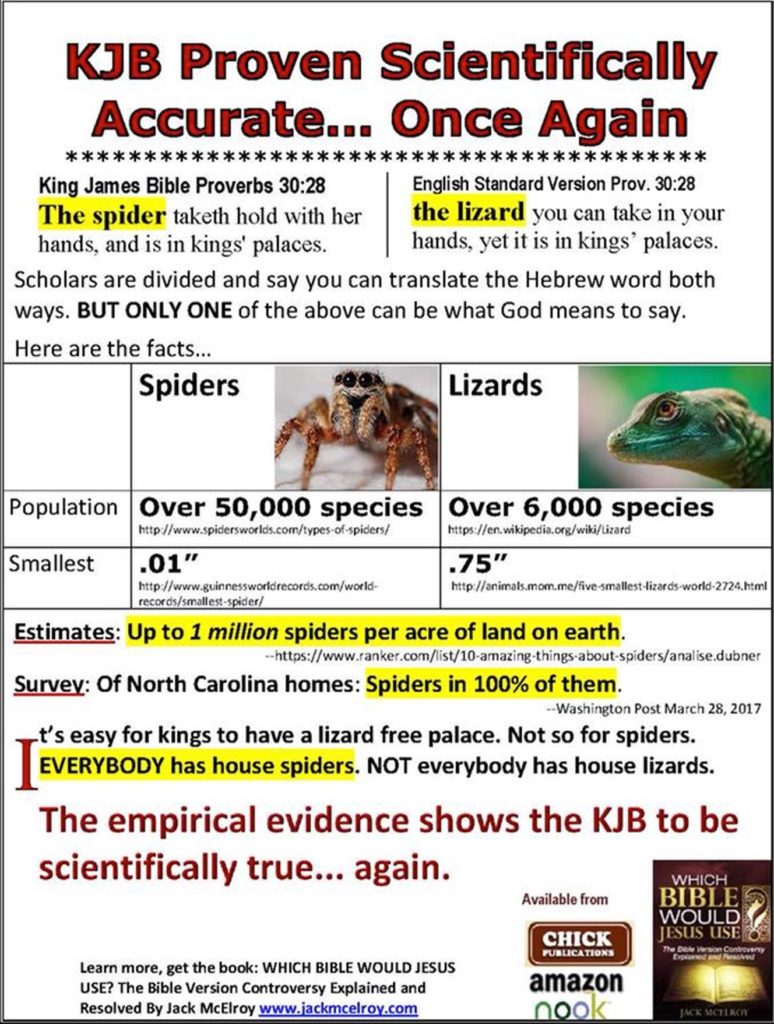Here once again is another response to a non-sensical, illogical argument made by KJV onlyist that only the KJV got the translation right in Proverbs 30:28.
“empirical evidence” ? What evidence is he talking about ? hmmmm…. Dealing with this kind of twisted logic is such a waste of time, but I won’t let this get away so that everybody may know how the KJV Only camp employs twisted kind of logic such as this just to prove something. Let this be a showcase of KJV Onlyisms sick logic.
The argument of the above meme can be presented syllogistically as follows:
Argument 1:
Premise 1: There are 1 million spiders per acre of land on earth
Premise 2: 100% of homes in North Carolina has spiders in them
Conclusion : It is easy for Kings to have a lizard free palace, but not so for spiders as EVERYBODY HAS HOUSE SPIDERS. Not everybody has house lizards.
Argument 2:
Premise 1: Everybody has house spiders
Premise 2: Not everybody has house lizards
Conclusion: The King James is scientifically true since it states that the “spider” taketh hold with her hands is in the King’s palace.
(Note that the conclusion in the 2nd argument is made arising from the argument that it is most likely that spiders are in King’s palaces and that lizards are not as commonly seen in King’s palace compared to spiders)
Now what kind of sick, twisted logic is that ? Even if you have not taken a subject in logic you know using common sense that the conclusion does not make sense at all !
However let me analyze using the rules of logic how wrong this argument is. The above arguments is an inductive argument considering that the above argument is anchored on probabilistic reasoning (The conclusion could be restated as: “hence most likely Kings or everybody has lizards in their palace but not spiders”) So specifically this is a “generalization” type of inductive argument (Generalization – an argument that proceeds from the knowledge of a selected sample to some claim about the whole group.)
So how do we know if this argument is a good argument ? A good inductive argument is a cogent argument. A cogent argument must meet these requirements:
1.) The argument must be “strong”
2.) All its premises are true.
If any of this is missing a inductive argument will be considered as uncogent and hence a bad argument. And what is a bad argument ? A screwed up, twisted argument used to mislead people. (Just like what the KJV Only camp do most (if not all the time, sad to say)
So let’s see if the above inductive argument is a good argument. Let me take you to the process on how to do this.
Step 1: First assume the premises are true
Step 2: Next we determine whether based on that assumption that the conclusion is probably true. Since this is specifically a generalization, we connect the information in the premises with what we know about a sample being representative of a population.
Let us examine Argument 1:
Premise 1: There are 1 million spiders per acre of land on earth
Premise 2: 100% of homes in North Carolina has spiders in them
Conclusion : It is easy for Kings to have a lizard free palace, but not so for spiders as EVERYBODY HAS HOUSE SPIDERS. Not everybody has house lizards.
In this argument the premises is actually true. But is the conclusion true ? (or even probably true) A reasonable person couldn’t come to that conclusion because just because 100% of North Carolina homes has spiders it does not necessarily follow that 100% of houses in the entire world has spiders. To conclude otherwise would be to reporting to the logical fallacy of composition (inferring that something is true of the whole from the fact that it is true of some part of the whole) It is a fact that spiders prefer warm weather and that there are fewer species of spiders in colder countries hence it could not be reasonably concluded that 100% of houses in the world has spiders in them. Since the conclusion is false the argument is weak, being a weak argument it could be said that the argument is not cogent and hence not a good argument.
Let me just add that the strength and weakness of inductive arguments allows for degrees. A strong inductive argument is one wherein the conclusion made is more probable than improbable. Assuming that the premises are true, the likelihood that the conclusion is true must be more than 50% and as the probability increases, the argument then becomes stronger. In the case above the sample size of premise 2 which is used to support the conclusion is small as it is only North Carolina. If the persons making this argument wants to increase the strength of this argument a much more larger sample size must be given in order the argument will become stronger.
Now let is examine Argument 2:
Premise 1: Everybody has house spiders
Premise 2: Not everybody has house lizards
Conclusion: The King James is scientifically true since it states that the “spider” taketh hold with her hands is in the King’s palace. (As it could be said that it is easy for Kings to have a lizard free palace, but not so for spiders as EVERYBODY HAS HOUSE SPIDERS. Not everybody has house lizards.)
In this argument, Premise 1 as we have discussed above is most likely not true. Premise 2 is however most likely true. Since one of the premises is false hence that alone shows to us that this is not a cogent argument and hence is a bad argument.
But assuming that both premises are true the question is, should we naturally expect that if not every has house lizards that since everybody has house spiders then the most likely animal found in King’s palaces are spiders ? The fact that not everybody has house lizards does not mean that everybody does not have house lizards. The premises is itself saying that there are definitely spiders in King’s palaces and there may be or may not be lizards in King’s palaces. Premise 2 does not say that there are no lizards in King’s palaces. So to conclude that the KJV is scientifically true just because it says “spiders” and not lizards is a weak because even the second premise does not support this conclusion absolutely.
Argument 2 is not a cogent argument because one of its premises is not true and it’s conclusion is a weak argument as it is not supported by one of its premises. Hence Argument 2 is not a cogent argument and being such, therefore it is not a good argument.
Both Argument 1 and 2 are now proven using logic to be bad arguments hence even logic (and the so called “empirical” evidence as the meme says) itself does not prove that the KJV is right on this matter.
Now having discussed how even the logic of the KJV Onlyist camp is so erroneous on this matter let us discuss the text itself.
The Hebrew word in dispute is “semamiyth” Even the Masoretic text, the underlying Hebrew text that the KJV uses says this word. What does this word mean?
Hebrew scholars, Keil & Delitzch in their commentary offers us this insight:
“But what kind of a beast is meant here is a question. . . . . . There remains now only the lizard (LXX, Jerome) and the spider (Luther) to be considered. . . . . But Aruch testifies that in these two places of the Talmud the explanation is divided between ragnatelo (spider) and (Ital.) lucêrta (lizard). For the latter, he refers to Lev. 11:30, where לטאה (also explained by Rashi by lézard ) in the Jerus. Targ. is rendered280 by חממיתא (the writing here also varies between שׁ and שׂ or ס). Accordingly, and after the LXX and Jerome, it may be regarded as a confirmed tradition that חממית means not the spider, for which the name עַכָּבִישׁ is coined, but the lizard, and particularly the stellion (spotted lizard). Thus the later language used it as a word still living (plur. סְמָמִיּוֹת, Sifre, under Deut. 33:19). The Arab. also confirms this name as applicable to the lizard.281 “To this day in Syria and in the Desert it is called samawiyyat, probably not from poison, but from samawah = שְׁמָמָה, the wilderness, because the beast is found only in the stony heaps of the Kharab” (Mühlau after Wetzstein). If this derivation is correct, then שׁממית is to be regarded as an original Heb. expression; but the lizard’s name, samm, which, without doubt, designates the animal as poisonous”
Even modern day Jews use the word “semamiyth” to refer to “Gecko” (See Google translate and other online translators)
OT scholar Bruce Waltke in the New International Commentary of the Old Testament however makes this comment “The meaning of the hap. leg., wall-lizard (śᵉmāmı̂t) is disputed. HALOT and others identify it “as a type of lizard: gecko, hemidactylus turicus,”217 but the Committee on Translations of the United Bible Societies and others prefer “spider.” The four-legged wall-lizard runs over walls and ceilings of Palestinian houses by means of sucking discs on its toes. It is so small and vulnerable that it can be caught (see v. 9b) with two hands (see 6:5). Verset B, instead of presenting a compensating wisdom for its vulnerability signified by the “and so,” draws the saying to its conclusion by asserting but it lives (see n. 71) in the palace (hêkᵉlê, cf. 1 Kgs. 21:1; Amos 8:3; Nah. 2:6 [7]; Ps. 45:15 [16]; Dan. 1:4) of the king (see v. 27). The plural hêkᵉlê signifies the inherent spaciousness and/or complexity of the palace.219 This conclusion points to wisdom’s reward of living in a luxurious royal palace. If the son, whom wicked men and women want to capture, exercises caution, though as vulnerable as a lizard, he too will live in the chief residence of the realm (cf. Psalm 45). Paradoxically, the people of God who are foolish by the world’s standards live in heavenly places”
Waltke though seems to agree that the world should be properly rendered as “lizard” more particularly “gecko.”
I do not know what is the reasoning of the United Bible Societies on why the prefer it to be “spider” but I disagree with them (And if you do a search a lot of Bible commentators and scholars also agree that the word “semamiyth” should be translated as “lizard”) (Take note that the meme above accuses the UBS of conniving with the Roman Catholic church to corrupt modern translations. Now you tell me why would the USB insist on translating this word as “spider” like the KJV does when a lot of modern translations translate this as “lizard” instead ? So is there really a UBS – Roman Catholic conspiracy or is this just one of those sick conspiracy theories cooked up by KJV Onlyist ?)
 Hi ! my name is Zigfred Diaz. Thanks for visiting my personal blog ! Never miss a post from this blog. Subscribe to my full feeds for free. Click here to subscribe to zdiaz.com by Email
Hi ! my name is Zigfred Diaz. Thanks for visiting my personal blog ! Never miss a post from this blog. Subscribe to my full feeds for free. Click here to subscribe to zdiaz.com by Email
You may also want to visit my other blogs. Click here to learn more about great travel ideas.


Leave a Reply